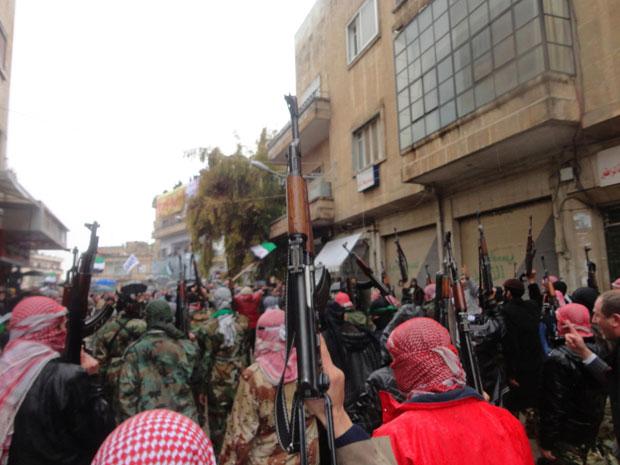Does Syrian crisis require international intervention?
Syrian soldiers who defected to join the Free Syrian Army are seen among demonstrators during a protest against Syria’s President Bashar al-Assad in Idlib. (Photo by Reuters.)
On Monday Arab League representatives met with the United Nations Security Council to discuss a plan of action for Syria.
More than 5,000 Syrians have been killed by government forces since protests against President Bashar Al-Assad began last March. Russia, a strong supporter of Al-Assad, floating a plan that would have them hosting negotiations between the regime and protesters, in Russia. Dissidents, however, have rejected that plan unless Al-Assad first agrees to transfer power to someone else, even his own vice president.
The United States has been an outspoken supporter of the dissidents in recent months, but has been reluctant to take any action. It’s also pressed for Security Council action to impose sanctions, but so far has been unable to win over support from Russia and, to a lesser degree, China.
“The longer the Assad regime continues its attacks on the Syrian people and stands in the way of a peaceful transition, the greater the concern that instability will escalate and spill over throughout the region,” Secretary of State Hillary Clinton said.
Shadi Hamid, Director of Research at the Brookings Doha Center, said its crucial that the international community intervenes in this crisis.
“We’ve tried nearly everything: mediation, diplomacy, the Arab League Mission. We’ve tried to reach some kind of understanding with the Assad regime, but he keeps on saying he’s not willing to make any real concessions or compromises,” Hamid said. “I think there’s been a very patient wait and a careful consideration of a variety of options, but there comes a point when people are being slaughtered that you have to say enough is enough.”
According to the United Nations, some 5,500 Syrians have been killed in what almost everyone now agrees is a civil war.
“If you compare that to Libya, where we intervened militarily after, really, just a month, you can see the contrast there,” Hamid said.
But there are differences between intervening in Libya, a relatively isolated North African nation, and Syria, a Middle Eastern nation with deep ties to Iraq, Iran, Lebanon and a shared border with Israel.
In an article for The Atlantic, Hamid said he’s not convinced military intervention is the only option, nor the best option. And it certainly can’t be an American-led intervention.
“There has to be an Arab and Muslim footprint on any involvement,” Hamid said.
Hamid said part of the reason this would work — and work better and with less animosity than previous interventions in the Middle East — is because the dissidents on the ground, the protesters, have asked for international intervention.
“Leading Syrian opposition figures have called for the U.S., E.U., Turkey and others to think seriously about establishing a safe zone,” Hamid said. “It’s not as if this is some western, imperial imposition and we’re doing this because of our own interest. Many Syrians on the ground and many of those in exile want us to think about military intervention.”
Obeida Nahas, a member of the Syrian National Council who is meeting with the United Nations, is arguing not necessarily for military intervention, but for international recognition of Syrians’ democratic aspirations.
“The Russians, in specific, have been so arrogant they ignored our aspirations for so long. Now, we come to the U.N. Security Council, backed by the Arab League and backed by many other countries around the world and it seems we are not getting there,” Nahas said.
Ultimately, Nahas wants international support and endorsement of the Arab League plan that calls for a political transition with Al-Assad leaving power.
“Let’s put aside the details. We know the Arab League plan leads at the end to Assad going,” Nahas said. “This is exactly why people have been uprising for months.”
Nahas said the Syrian people have been remarkable patient as the world has adjusted to their power and longevity. In fact, it wasn’t until August that anyone even entertained the thought of the long-time dictator stepping down.
The Syrian people have been calling for that all along, Nahas said. And Assad has not listened.
“He has to go. All this bloodshed, he can’t continue. This is a country that cannot be ruled by him any more,” Nahas said.
